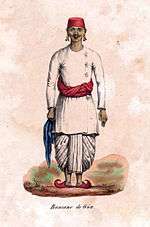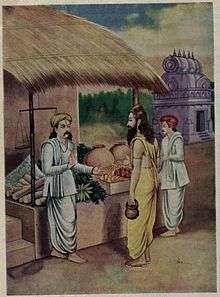Bania (caste)
 A Goan Bania, early 1880s | |
| Languages | |
|---|---|
| Hindi, Marwari, Punjabi, Gujarati, Dialects of Marathi and Konkani.[1] |
The Bania (otherwise known as Baniya,Vaniya, Vani and Vania) is an occupational community of merchants, bankers, money-lenders, dealers in grains or in spices, and in modern times numerous commercial enterprises. The term is used in a wider sense in Bengal than it is elsewhere in India, where it is applied to specific castes.[2]
Etymology

A traditional Bania
In western India the caste is called Vani or Vania. Although in Bengal the term is applied to all people who are involved in moneylending and similar activities, elsewhere in India it is used in the more limited sense of referring to specific castes.[2]
See also
References
- ↑ Gazetteer of the Union Territory Goa, Daman and Diu: district gazetter by Vithal Trimbak Gune, Goa, Daman and Diu (India). Gazetteer Dept, published by Gazetteer Dept., Govt. of the Union Territory of Goa, Daman and Diu, 1979
- 1 2 Schrader, Heiko (1997). Changing financial landscapes in India and Indonesia: sociological aspects of monetization and market integration. LIT Verlag Münster. p. 68. ISBN 978-3-8258-2641-3. Retrieved 2012-02-09.
Further reading
- Cheesman, David (1982). "'The Omnipresent Bania:' Rural Moneylenders in Nineteenth-Century Sind". Modern Asian Studies. 16 (3): 445–462. JSTOR 312116. (Subscription required (help)).
- Metcalf, Thomas R. (December 1962). "The British and the Moneylender in Nineteenth-Century India". The Journal of Modern History. 34 (4): 390–397. JSTOR 1880056. (Subscription required (help)).
This article is issued from
Wikipedia.
The text is licensed under Creative Commons - Attribution - Sharealike.
Additional terms may apply for the media files.